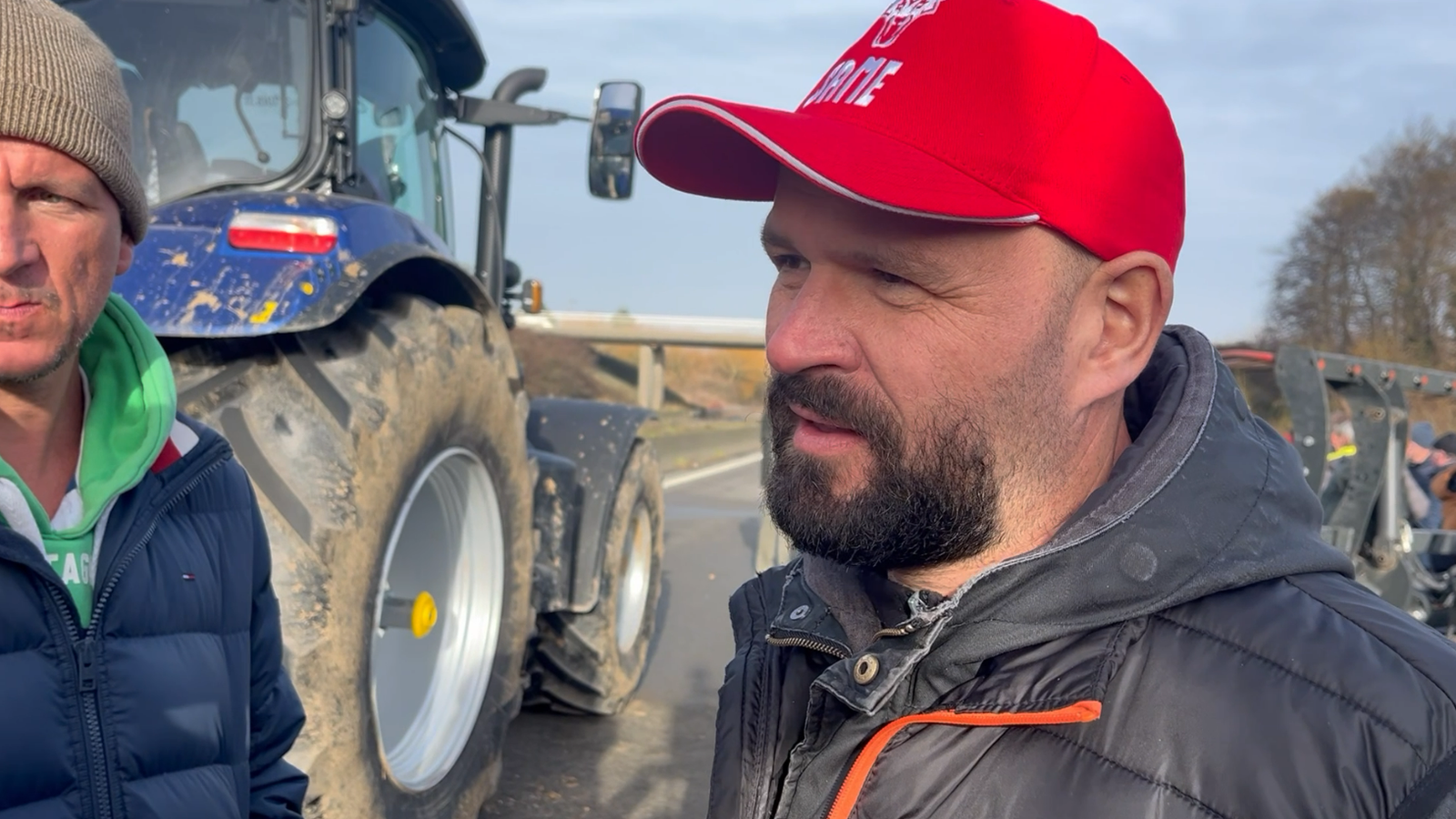We are standing in the middle of a motorway – the Eurotunnel is only a junction away, but nothing is moving.
Next to me, Damien Delattre, an arable farmer from near Calais, is showing me his tractor.
“It has been used for 6,000 hours, so it is middle-aged,” he says. “Just like me.”
Damien, along with dozens of other farmers, has parked his tractor on the carriageway and climbed out, blocking the traffic.
On the brow of the hill, about a quarter of a mile away, the traffic is stacked up – lorries waiting to get through, drivers battling to get to the Eurotunnel terminal.
But here, standing on the road, everything feels remarkably calm.
A brazier is lit and drinks are handed out. It’s like a thousand other picket lines from history, except this one is in the middle of a motorway.
The police, positioned to the side, watch and wait. They have clearly worked with the farmers to ensure that most traffic can find a way through and that the blockades, while aggravating, do not become a more serious problem.
Read more:
Protests by farmers in France spread to Brussels
But the imagery is what matters here, and the farmers’ protest is becoming a mosaic of blockades across the nation. The message is also clear – that farmers have the power to paralyse France.
There are a variety of complaints that you hear, but they boil down to one theme – that they feel left behind, forgotten and disadvantaged. That their role – in feeding the nation – is taken for granted while their problems are ignored.
“For years we have been silent,” says Damien. He is 51 years old and has been a farmer for half his life, but says that his job is becoming ever more difficult.
“All we do is work and you know what – I lost a very good friend of mine last week. I’m sorry, but he hanged himself. It’s common now in our profession.
“What do you want from the politicians who are watching these protests,” I ask.
“They need to understand our problems – we don’t need any more easy words. They need to really listen.
“Look – three years ago, nitrogen fertiliser costs €180 (£153) per ton. Last year, the price had gone up to €700 (£598).
“How can we deal with that?”
He got a call from friends yesterday inviting him to join the protest, and didn’t hesitate.
As we speak, there are hoots of support from lorries passing by on the other carriageway.
There are many people who feel sympathy for the plight of the farmers, even more so after the death of a mother and her daughter, who were killed when a car drove into a blockade in southwestern France.
Among the farmers we spoke to, there was a determination to make the most of this moment.
They take support from the impact made by farmers’ protests in Germany, Poland, the Netherlands and elsewhere.
There is talk of columns of tractors arriving in Paris to bring the capital to a standstill.
“Would you join that?” I ask Damien. “Yes, of course. It’s easy to get to Paris.”
For the moment, it goes day by day. Some protest movements, like the Gilets Jaunes, go on for years. Some burn brightly and then fade away.
The farmers are resolute, but part of their problem is that their jobs really are demanding.
Be the first to get Breaking News
Install the Sky News app for free
Read more from Sky News:
Paris honours David Bowie with his own street
Avalanche kills British mother and son skiing on Mont Blanc
Breaking away to block a motorway is not something you can do all the time without hurting your livelihood even more.
However, this isn’t just about the plight of the farmers, but also about a rumbling, widespread discontent against authority.
The protests are being seized upon by various groups, most notably the Rassemblement National (RN), Marine Le Pen’s right-wing political party, as another lever with which to bash Emmanuel Macron’s presidency.
They have applauded the farmers, claiming Macron is happy to see French agriculture wither away.
European elections loom later this year and the RN, along with populist and anti-Establishment groups across Europe, is tipped to prosper.
As the tractors drove off at the end of the day, we saw a tall figure applauding the farmers – an RN politician, waving at the tractors.
And tomorrow, the farmers will protest again. Their anger is simmering. The question is whether, when and how it might boil over.
Anyone feeling emotionally distressed or suicidal can call Samaritans for help on 116 123 or email [email protected] in the UK. In the US, call the Samaritans branch in your area or 1 (800) 273-TALK








